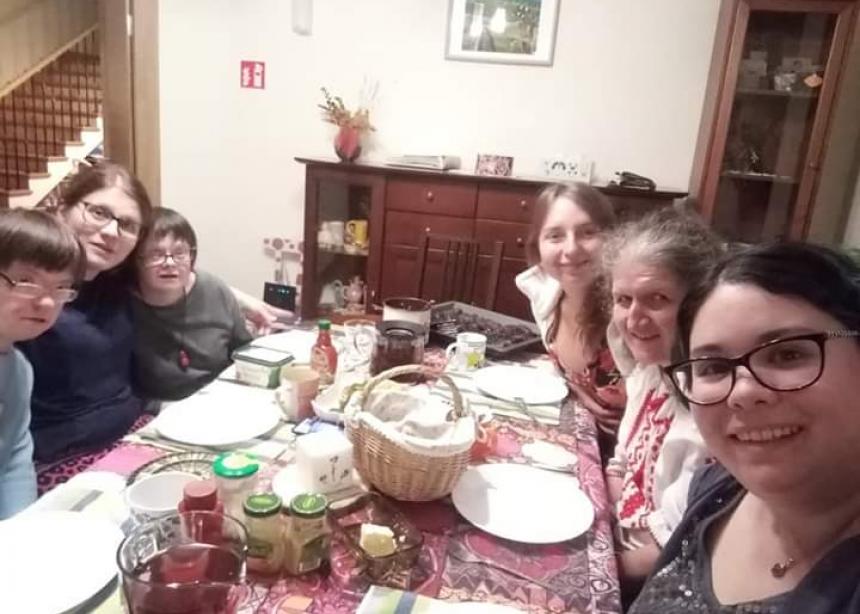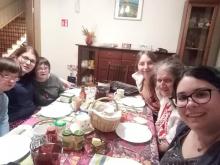Since its inception, L’Arche has been built on the values of mutual sharing, building relationships and being a signpost to the world that friendships with people who have disabilities is possible. In my last six years as an assistant in L’Arche communities in Canada and Scotland, I have found this to be the case, but I had one question in mind: “How does this look when a community doesn’t speak English?” Can I, as someone who more or less is mono-fluent, still feel the presence and spirit of L’Arche even when it is not conveyed in words? In order to explore this concept, I chose to spend a week with the L’Arche community in Warsaw, Poland.
It was about three weeks before my trip and my L’Arche mentor suggested to me that I be in touch with the community. I had originally planned to go only for tourism, so the idea was to stay at a hostel and then spend the rest of the time seeing museums and galleries. I simply wanted to spend one evening with the Warsaw community having dinner together, but the response I received back was very different. “Would you like to come and stay with us? You would be very welcome.”
I wrote back: “Thank you for your kind response, but I intend to stay a week in Warsaw and that is too much to ask.”
“Really, it is OK. We would like to welcome you!”
And so, with the possibility of staying in L’Arche right in front of me, I chose to agree.
Sharing life together
My days were then spent sharing life together with the Warsaw community. Eating meals together, taking part in workshops (ceramic and dance), helping to prepare food, taking part in the Family Day activities of dancing and celebration, sharing in evening prayers, and just getting to know the people with disabilities.
On my first day in Warsaw, I went to the ceramic workshop where we made birds and flowers. Two things stand out to me about this day.
#1: The hospitality of someone with a disability. Aga, a middle-aged woman with Down Syndrome, did all she could to make me feel welcome. Despite the language barrier, she always was telling one of the assistants to ask me how I was and if I needed anything. She continually waved and smiled at me every time she saw me and always wanted to sit down next to me. She even asked one of the assistants to teach her some English words. She began with “good” (thumbs up,) praising me for my efforts in the pottery work. She always asked, “Coffee? Tea?” And when I said no, she insisted on still bringing me whatever she envisioned the desired items were. Near the end of my stay, I was sitting downstairs on the couch journaling, with her just resting her head on my shoulder, and it was honestly such a moment of tenderness and togetherness. It was obvious we had bonded.
#2: The involvement of children. In Warsaw, community is a family affair. In everything, children were included. Local children came to also take part in the ceramic workshop, and I found this to be a brilliant idea. What better way to get kids thinking about disability inclusion than to include them when they are still young and impressionable to work alongside people with disabilities doing the exact same work?
The theme of children seems to be one that L’Arche Warsaw has carried out over the years. Originally founded 33 years ago with a single flat and only one person with a disability, L’Arche ventured into new territory by creating a children’s home and spending the last several decades advocating for disability rights, especially in the education sector. This is a long history I was nowhere near aware of (because in Canada and the UK, L’Arche is primarily geared toward adults only).
The struggle to continue to fight is an amazingly resilient spirit so evident in the Polish community. Speaking with the assistants, I learned that there are so many things we take for granted in well-off Western societies. Although there is still more work to be done in inclusion, people with disabilities in the West tend to be given many more opportunities. In Poland, this is not the case. The government does not see the disability sector as being of major importance, and as a result, L’Arche receives very little government funding. The funding they receive (about a few thousand dollars per year) is only geared toward special projects and must be re-applied for every year with no guarantees it will be granted. Society (at least in the older generation) finds L’Arche an anomaly and does not quite grasp the concept. Yet, despite being a poor community, L’Arche Warsaw does not operate with a spirit of poverty. Instead, they were incredibly welcoming and generous to me in a way that culturally I have not experienced to this level in the more reserved cultures of North America and the UK.
Giving and receiving
On my last day in Poland, two assistants from L’Arche asked me if there was anything in particular I wanted to see or experience. I told them that while I had tried various savory Polish foods, I still desired to have a cake, so they took me to a small cafe in the Old Town of Warsaw that is run by adults who have disabilities. I had heard of places like this before, but I had never been to one. It was amazing to be served and looked after by someone who had autism, and this reminded me that life truly is about mutuality. In a caregiving role it can be easy to feel like one is giving all they can to another person, but it is always more important to remember what one is getting back—the love and care of those who see life differently than we do.
Being in L’Arche Warsaw was one of the most amazing experiences I have ever had, and it’s one that I hope will always stay with me. It was a humbling experience to be so well looked after, and it was amazing to see the love and care shared between all the household members—assistants and people with disabilities alike. Although much more structured and somewhat rigid, there was a certain levity to it all, an evident trust, a deep tenderness. The spirit of community was so present in everything, even despite me hardly speaking any Polish. In fact, it felt like friendships were still being formed, that bonding was still happening.
When I reflect on this past week, though, one thing in particular sticks out in my mind, and it is something I would like to share as a closing thought. In many English-speaking L’Arche communities, people with disabilities are called “core members.” When I was in Poland, I asked the assistants what core members are called there. “People,” they said. “People?” I queried. “Yes, just people,” they responded.
I think this truly is the whole point of advocacy work. We are here to help encourage and support people with disabilities to have the best life possible, to be seen as truly human in every sense of the word, but at the end of the day when all the labels have been dismantled, they are truly the same as us. We all are just people.
Originally from Ontario, Deborah-Ruth Ferber has worked as a live-in assistant for people with developmental disabilities in several L’Arche communities in Ontario, Nova Scotia, and the United Kingdom. She is passionate about building friendships with people with developmental disabilities and supporting people living with mental illness. Deborah-Ruth serves as a field associate for Anabaptist Disabilities Network. This post originally appeared at anabaptistdisabilitiesnetwork.org.



Add new comment
Canadian Mennonite invites comments and encourages constructive discussion about our content. Actual full names (first and last) are required. Comments are moderated and may be edited. They will not appear online until approved and will be posted during business hours. Some comments may be reproduced in print.